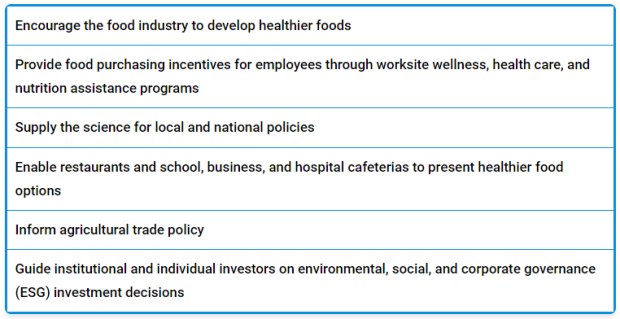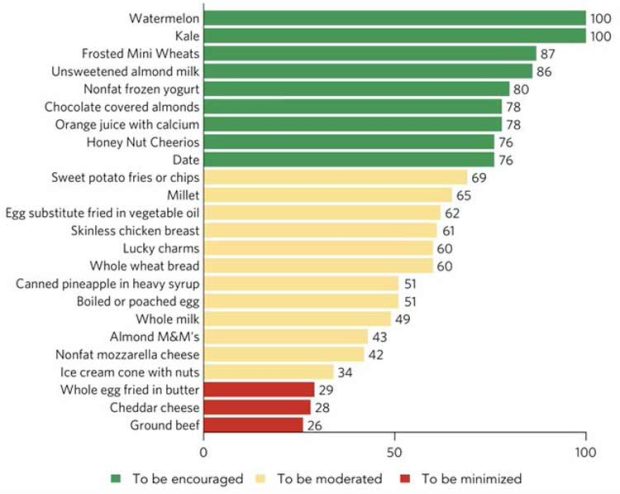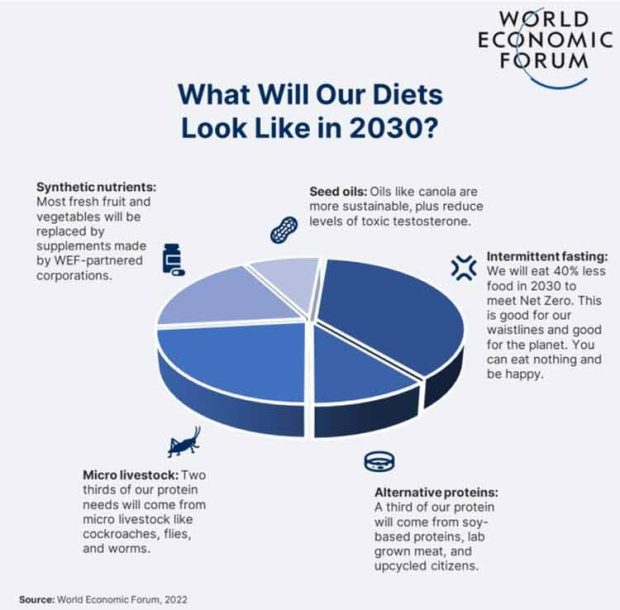According to the World Economic Forum (WEF) and its allied Great Reset minions, a traditional whole food diet is not only “unsustainable” but “environmentally destructive.”
A recent “food analysis” in The Guardian1 took aim specifically at organic pasture-fed beef and lamb, lambasting such farming practices for their extravagant land use while underperforming in terms of yield:
“Arable crops, some of which are fed to farm animals, occupy 12% of the planet’s land surface. But far more land (about 26%) is used for grazing: in other words, for pasture-fed meat and milk. Yet across this vast area, farm animals that are entirely pasture-fed produce just 1% of the world’s protein.”
Animal foods in general, and organically produced ones in particular, The Great Resetters claim, must be replaced with produce genetically engineered for high yield and pest resistance, and protein alternatives made from insects, plants and synthetic biology. Overall, life on earth cannot be sustained, they say, unless we transition to what amounts to an ultraprocessed and highly unnatural diet.
A paper2 published in the September 25, 2022, issue of the Journal of Cleaner Production throws The Great Reset’s talking points in the proverbial trash, but before we get into that, let’s review some background material.
Global Cabal’s Goal: Wipe Out Good Food
In recent months, I’ve dedicated many articles to exposing the intentional destruction of our food system. The decision of the Dutch government to impose nitrogen pollution restrictions on farmers is only one recent example of this. This “green” policy will cut livestock production in the country by 30% in the next year, put farmers out of business and force them to sell their land.
Since The Netherlands is the largest meat exporter in the European Union,3 this plan will inevitably result in meat shortages around the world. Canada is now also implementing identical restrictions as part of its climate plan.4
Not to worry, though, because The Great Reset leaders around the world have a plan to build a new food system based on “micro livestock” like crickets, mealworms and cockroaches, along with cultured meat5 grown in petri dishes, and plant-based meat alternatives such as Beyond Meat, the primary ingredients6 of which are pea protein, canola oil and rice protein.
The Plan for a Planetary Health-Destroying Diet
The EAT Forum, cofounded by the Wellcome Trust and the Stockholm Resilience Centre in 2014,7 has developed what they call “The Planetary Health Diet,”8 intended to be applied worldwide. It entails cutting meat and dairy intake by up to 90%, and replacing it with foods made in laboratories, along with cereals and oils, most of which are now genetically engineered (GE).
Their largest initiative is called FReSH, which aims to transform the food system by working with biotech and fake meat companies to replace whole foods with lab-created alternatives — all in the name of climate change prevention and “sustainability.”
Once tech giants have control of meat, dairy, cereals and oils, they will be the ones profiting from and controlling the food supply. Needless to say, the private companies that control the food supply will also end up controlling countries and entire populations. At the end of the day, that’s what this hoopla about “sustainable food systems” is all about.
Junk Food on Steroids
However, anyone who knows anything about nutrition can see that everything about this proposed new food system is a disaster in the making. For starters, synthetic biology — meat and dairy alternatives — is junk food on steroids.
They’re all highly processed, and ultraprocessed foods are associated with increased calorie intake, weight gain and chronic disease,9 including cognitive decline,10 while simultaneously promoting malnutrition.
One of the primary reasons why processed food is so bad for health is because it’s loaded with the omega-6 fat linoleic acid (LA) mostly from industrial seed oils. It’s important to realize that plant-based meat alternatives do not contain animal fats. All the fat comes from industrial seed oils like soy and canola oil, which are prescriptions for metabolic disaster.
Sure, processed foods also contain high amounts of sugar, typically in the form of high fructose corn syrup, but as bad as that is, it doesn’t even come close to the damage caused by high LA intake, which acts as a metabolic poison. What’s worse, the LA stays put in your cell membranes for up to seven years, while sugar is rapidly used up and eliminated once you stop putting more in.
To be clear, LA is the one fat you absolutely want to minimize in your diet, not eat more of! Anything above 10 grams a day is likely to cause ill health, and most Americans consume far more than that already. To learn more about the harmful mechanisms of LA, see “How Linoleic Acid Wrecks Your Health.”


In my view, replacing real meat with fake substitutes, regardless of how they’re made, is going to further exacerbate the rapid decline in health the population has already experienced. Next week I will be posting a report on the record-breaking decrease in U.S. life expectancy that just had its sharpest two-year decline in 100 years.11
Simply put, there are no benefits in replacing real meat with fake substitutes. Not for the environment, climate, human nutrition or animal welfare. It’s only hazards and false claims. So, if you value your health, you would do well to stay clear of all meat substitutes.
Why Insect Protein Is a Bad Idea
Alright, but what about insect protein? According to The Great Reset minions, insect protein is as good as it gets, nutrition-wise, and will protect the planet by eliminating the need for livestock, cutting down on agricultural land use and reversing climate change.12
Not so fast. Perhaps someone didn’t think this through. (Or, they did, and any potential negative ramifications of an insect-based diet are actually their intended effects.) As it turns out, insects contain chitin,13,14 a highly inflammatory and allergy-inducing compound.15
Some human tissues do have a chitin-destroying enzyme called chitinase, but it doesn’t always work well, in which case the chitin may trigger an immune response, allergic reactions and inflammation, as it increases inflammatory cytokine production.
Edibleinsects.com, however, launched in 2022, describes chitin as “a valuable prebiotic fiber” with antifungal, antiviral and antibacterial properties,16 and eatcrickster.com claims it can reduce inflammation.17 A number of studies published in recent years have made similar claims.
I for one would recommend proceeding with great caution, as the food industry has, for decades, claimed that processed foods and artificial ingredients are safe and effective, just like the COVID jab, even when ample research shows otherwise.
Food Compass Designed to Destroy Nutrition Guidance
A perfect example of how unhealthy, ultraprocessed foods are being touted as superior to unprocessed animal foods is the Friedman School of Nutrition Science and Policy’s Food Compass,18 unveiled in late 2021. Food Compass was created to:19

The problem is that Food Compass leads people AWAY from wholesome natural foods, and toward processed junk foods. For example, Frosted Mini Wheats scores three times higher than ground beef (87 out of 100, compared to 26), as illustrated in the graph below, posted on Twitter by independent journalist Nina Teicholz.20

Other high-scoring, highly processed foods include chocolate covered almonds, Honey Nut Cheerios, fries, egg substitute fried in vegetable oil, and Lucky Charms. Almond M&M’s even score higher than whole egg fried in butter, cheddar cheese and ground beef — all three of which are whole, unprocessed foods.
Who in their right mind can believe M&Ms are healthier than whole food — any whole food? According to Food Compass, anything with a score below 30 should be minimized, so based on this tool, you’ll be healthier if you replace whole egg, cheddar cheese and ground beef with candy, which is nothing short of insanity.
That’s how you know it’s serving a purpose other than actual nutrition guidance. It’s a Great Reset tool to miseducate people about what’s healthy and what’s not. Without false propaganda, they won’t be able to retool the food system the way they want to.
Interestingly, the top fruit, watermelon, is actually quite healthy for most and it is my absolute favorite fruit. Just be careful to avoid eating the seeds as they, like most seeds, are loaded with LA.
Ultraprocessed Foods Are NOT ‘Green’
Having reviewed why The Great Reset’s ideas for a new food system is a disaster for your health, let’s jump into the Journal of Cleaner Production paper21 I mentioned at the beginning.
The title of the paper is “A Conceptual Framework for Understanding the Environmental Impacts of Ultra-Processed Foods and Implications for Sustainable Food systems.” It explains why ultraprocessed foods are completely counterproductive to environmentally “green” and sustainable goals. For example, ultraprocessed foods (UPF) account for:
- 17% to 39% of total diet-related energy use
- 36% to 45% of total diet-related biodiversity loss
- Up to one-third of total diet-related greenhouse gas emissions, land use and food waste
- Up to one-quarter of total diet-related water-use among adults in high-income countries
Ultraprocessed food production and manufacturing also significantly contributes to the degradation of land, promotes herbicide use, and contributes to eutrophication (aka nutrient-induced increase in phytoplankton productivity).
And, for all the lip service paid to making sure there’s “equity” in all areas of life, increasing consumption of processed foods redirects finances away from smaller farmers and homesteaders, thereby contributing to “economic inequalities as some large transnational corporations responsible for UPF production rely on underpaid food system workers in poor conditions, resulting in an uneven distribution of wealth.” In other words, promoting consumption of processed foods:
- Promotes financial inequity, the exact opposite of what The Great Reset supporters claim to be working toward
- Promotes biodiversity loss and degrades both land and water, which is the opposite of environmental and planetary protection promised by Green New Deal supporters
Ultraprocessed Foods Are ‘Fundamentally Unsustainable’
As noted by the authors:22
“The findings highlight that environmental degradation associated with UPFs is of significant concern due to the substantial resources used in the production and processing of such products, and also because UPFs are superfluous to basic human needs …
UPFs utilize persuasive marketing and are usually mass-produced using inexpensive ingredients to enable overconsumption through availability, hyper-palatability, poor satiety and displacing wholefoods in diets.
A growing body of evidence reports that UPF consumption is associated with increased risk of overweight and obesity, cardiovascular diseases, type-2 diabetes, metabolic syndrome, irritable bowel syndrome, cancer, depression, and all-cause mortality, among others. It is plausible that this is caused by UPFs poor nutrient composition and degraded food matrices …
A detailed understanding of the environmental impacts of UPFs is key to informing food policies and dietary guidance. This is pertinent because UPFs are frequently excluded from global and national guidelines and policy documents on sustainable food systems and diets.
For example, the EAT-Lancet report, one of the most recognized reference documents on sustainable diets, does not mention UPFs, nor does the major FAO report on the biodiversity impacts of food and agriculture.
The few policy activities which consider the environmental sustainability of UPFs are based on conceptual evidence, rather than evidence from empirical studies …
Conclusion: Ultra-processed foods are fundamentally unsustainable products; they have been associated with poor health and social outcomes and require finite environmental resources for their production … UPFs are responsible for significant diet-related energy, [and] greenhouse gas emissions …”
The real take-home here is that the environmental impacts of ultraprocessed foods are AVOIDABLE, because these kinds of foods are NOT nutritionally essential. They could and should be eliminated altogether, if we actually want to protect the environment, our planet and our health.
What we need more of is organic, biodynamic and regenerative farming of everything from fruits and vegetables to animal foods. That’s what the world needs for optimal health, and it’s also what can preserve and improve our environment the best.
Reject The Great Reset Diet
As noted in a 2004 review in the American Journal of Clinical Nutrition,23 “many health disparities are linked to inequalities in education and income.” A nutrient-dense diet typically costs more than a calorie-dense but nutrient-deficient one.
One reason for this is because high-calorie processed foods contain ingredients subsidized by government, such as corn, wheat, sugar and various seed oils. Because they provide better profit margins for industrial farmers, there’s little incentive to grow crops that don’t make it into the processed food cycle. Back in 2016, the WEF published an article titled “What Will We Eat in 2030?”24
Taking note of the health and income disparity link just mentioned, the article proposes to improve the food system, not by reducing processed foods, but by processing foods which they claim are “ways that are better for our health,” such as “fortification (or biofortification) — where nutrients are engineered in, either in the biology or manufacture of food — and the significant reformulation of current foods for fewer calories and more nutrients.”
“‘Ultraprocessed’ foods need not be unhealthy,” the WEF goes on to claim. This is as big a lie as “Roundup is safe enough to drink,” “Smoking is safe for pregnant women,” “DDT is good for me” and “COVID vaccines are safe and effective.” There is no way to make ultraprocessed food healthy. Period.
Below is a graphic that has circulated on Twitter,25 showing the WEF’s plans for our dietary future. For the record, while it claims to have been sourced from the WEF, the clear sarcasm suggests it’s a spoof. It’s highly instructive, however, and right on the money, in terms of being factually correct.
This is indeed the kind of diet the WEF and its Great Reset allies want us to adopt, whether we want to or not. Even the most questionable inclusion of “upcycled citizens” is not wrong, as this cabal is, in fact, promoting the idea that cannibalism is, or can be, acceptable.

For solutions to this rapidly approaching dystopian future, review my previous article, “Why Food Prices Are Expected to Skyrocket,” and Corey Lynn’s article “Finding Sources of Fresh Food.”26
Part of the answer is to grow your own food, to the best of your ability. Another part is to support local growers by buying their produce, or else they’ll get pushed out. Starting local co-ops and community gardens can also go a long way toward creating food security in the long term.
At the same time, we also have to reject globalist solutions like fake meat, gene-edited beef, GMO foods, insect-based foods and all the rest of it. It’s time to recognize that none of their solutions are for our benefit. They’re for our detriment. The WEF has declared that by 2030, you will own nothing, and they really do mean it. They will take everything from us, including the right to grow our own food and to eat natural unprocessed, unadulterated foods — if we let them.
Sources and References
- 1 The Guardian August 16, 2022
- 2, 21, 22 Journal of Cleaner Production September 25, 2022; 368: 133155
- 3 Plant Based News September 27, 2021
- 4 Climate Depot July 10, 2022
- 5 Food Science of Animal Resources May 2021; 41(3): 355-372
- 6 Beyond Burger Ingredients
- 7 EAT Forum Gunhild Stordalen
- 8 EAT Forum Planetary Health Diet
- 9 NIH May 16, 2019
- 10 CTV News August 1, 2022
- 11 The New York Times August 31, 2022
- 12 WEF July 12, 2021
- 13 UCSF.edu April 23, 2007
- 14, 16 Edible Insects What Is Chitin?
- 15 Clin. Rev. Allergy Immunology April 2018; 54(2): 213-223
- 17 Eatcrickster.com Chitin
- 18 Food Compass
- 19 Tufts Now October 14, 2021
- 20 Twitter Nina Teicholz July 17, 2022
- 23 American Journal of Clinical Nutrition January 2004; 79(1): 6-16
- 24 WEforum November 10, 2016
- 25 Google Images Search
- 26 Corey’s Digs May 9, 2022
Copyright © Dr. Joseph Mercola